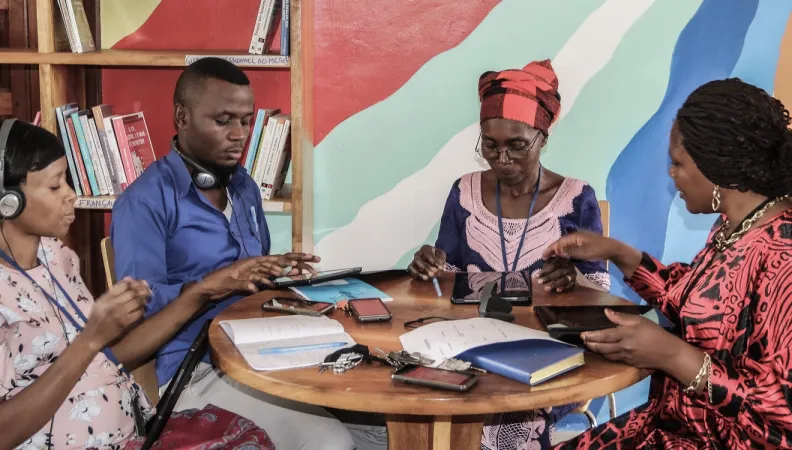Share the page
Using AI to improve language learning in Senegal
Published on

While French is the official language in the Senegalese school system, only a minority of teachers and pupils speak it as their first language. With support from AFD, the NGO Libraries Without Borders is trialing an AI-powered language learning app with teachers in Dakar and Thiès to help improve academic performance in schools.
AI Senegal
French is the official language of the education system in Senegal, and is essential for people to find information, complete administrative paperwork and get a job. However, for most teachers and pupils, French is not their mother tongue. A recent study determined that the majority speak other local languages in class, such as Wolof, Pulaar, Serer, Diola, Mandingo or Soninke. Nonetheless, it has been proven that bilingual learning, where French is combined with one of these languages, improves pupils’ academic results and opens up new career opportunities.
The international NGO Libraries Without Borders (LWB) aims to improve teachers’ proficiency in French to help boost students’ academic performance. It has launched a project, supported by Agence Française de Développement and run in collaboration with the Senegalese Ministry of Education, to provide educational tools tailored to teachers' needs by incorporating AI into its language learning app, Karibu.
“The goal is to create a more personalized, engaging and effective learning experience. The app can now generate exercises that correspond to the user’s level and main interests. They can also write in the app and are provided with detailed, individual feedback,” says Cormac O’Keeffe, Director of Education, Impact and Research at LWB.
Technology that can be deployed rapidly
Developed with the social enterprise Kajou and the research lab Pleias, this simple and sustainable platform is based on a LLaMA (Large Language Model Meta AI) language model with seven billion parameters. The Senegalese Ministry of Education has integrated a wide of variety of French text and royalty-free content into the app, with the aim of developing activities that are specifically geared towards the linguistic and cultural context in Senegal.
“Generative AI offers incredible opportunities for the three key pillars of education: teaching, learning and assessment. It can be used to mark students’ work, create personalized exercises, facilitate lesson preparation and provide training, while adapting these activities to local regions and cultures. The aim is obviously not to replace teachers, but to help them do their job,” adds Cormac O’Keeffe.
“The key advantage of AI-based apps is that they can be rolled out quickly and relatively cheaply,” says Alexis Frémeaux, Head of Innovation at AFD.
See also: Artificial Intelligence, a driving force for change in Africa
Thirty elementary school teachers in Dakar and Thiès are participating in the initial pilot, which will run from February to March 2025. “We are really looking forward to getting their feedback which will inform our participatory, continuous improvement process for the app,” says Cormac O’Keeffe.
If this project has a positive impact on teachers’ French levels, the app could be rolled out on a wider scale and new features could also be added, such as oral conversation. LWB is also looking at creating different versions of the app in other local languages, to make it easier for teachers to communicate with students and their parents, and develop a multilingual education approach.
